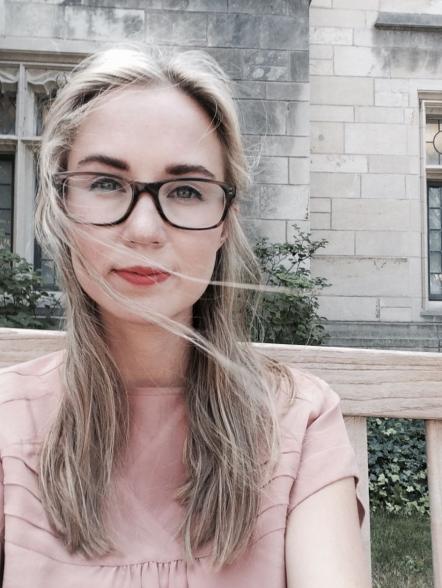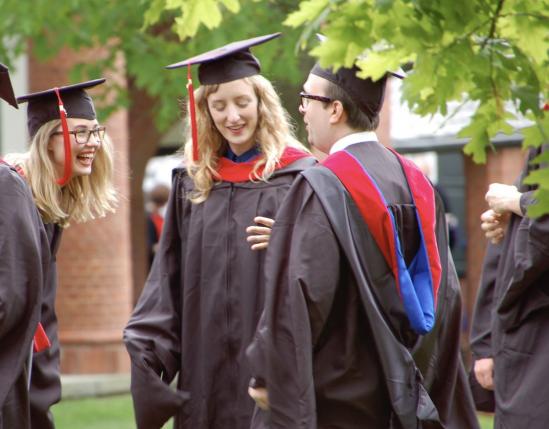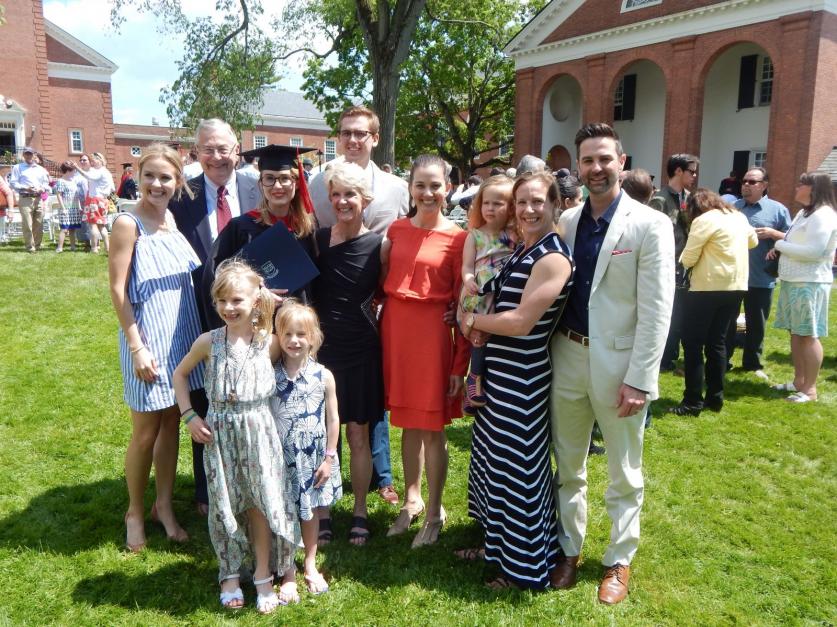By Ellen B. Koneck ’16 M.A.R.
Wednesday, September 2, was the official start of classes for Yale’s Fall 2015 semester. Wednesday, September 2, was also the day—1,200 miles away—my brother died by suicide.
But on Tuesday, September 1, 2015, I hopped on the train from New York (where I live) to New Haven. Even though my classes fell on Thursdays and Fridays, I headed up to campus a few days early to buy my textbooks and meet with a professor to outline an independent study. As a transfer student, I was finishing my M.A.R. program at Yale Divinity School a semester early and all was falling into place: I had a new planner, I’d gotten into the classes I wanted, my requirements for graduation were fulfilled and we were about to sign a lease on a new apartment—I was determined to start my last first day of school with everything in order.
 So on September 1, I strolled through New Haven and bumped into old classmates who asked about my summer adventures and class schedule. I bought my textbooks and dropped by the offices of faculty and staff with whom I’ve worked or learned. Arriving early to a meeting with a professor, I sat outside on a bench for a few minutes and basked in the warm sun and cool air of late summer. I took a selfie and sent it to my husband. When I see that picture now, I think I look different. Sometimes it startles me to see it.
So on September 1, I strolled through New Haven and bumped into old classmates who asked about my summer adventures and class schedule. I bought my textbooks and dropped by the offices of faculty and staff with whom I’ve worked or learned. Arriving early to a meeting with a professor, I sat outside on a bench for a few minutes and basked in the warm sun and cool air of late summer. I took a selfie and sent it to my husband. When I see that picture now, I think I look different. Sometimes it startles me to see it.
On Wednesday, September 2, 2015, my older sister called. She barely said anything. What language she could muster came out choked and garbled, in gasps and sobs. Louie is dead. Louie is dead. Louie is dead.
—-
There are so many inane things that are suddenly required in the midst of trauma and mental anguish—giving directions to a cab driver so I could get to my twin sister’s workplace in New York before she got the same phone call; trying to pack a suitcase for, dear God, my own brother’s funeral; desperately searching for flights home to escape the crazed isolation of being over 1,000 miles from the place of his last breath. I was confused to find that the world didn’t know, didn’t accommodate me. And this was the most inane requirement of all—communicating what I felt should have been obvious to everyone: that the whole world had gone dim and reality had come to a screeching halt. I couldn’t bring myself to explain this. I made my husband do it.
He made phone calls and sent emails and texts to my close friends so that I didn’t have to say “suicide”; so I didn’t have to answer their questions or catch them up or pretend to be grateful when they offered hollow consolation; and so I didn’t have to email the deans at Yale and tell them that I would be gone for awhile, and didn’t know when—or if—I would be back.
We arrived in Minnesota, at my hometown and my parents’ home. Maybe you wouldn’t think that you can experience a negation, a dearth, but being in places where Lou had been, where we had formed memories and interacted and laughed and fought, made his absence palpable. I didn’t go in his bedroom—I wasn’t ready to bear the tangible shadows of Lou that lingered there. Friends and family and neighbors and strangers brought over eggbakes and shared their memories, laughter, and tears with us. It was an uncomfortable comfort to be the place that people came to grieve.
—-
A day or two passed. I received an email from Dean Jennifer Herdt and a voicemail from Dean Greg Sterling, at which point I realized my husband had successfully communicated the reason for my absence—something I hadn’t thought about since arriving in the Midwest. Nicholas Lewis ’13 M.Div., the then-new associate dean of student affairs—whom I had never met—called me shortly after. Walking barefoot around the circle driveway of my parents’ home, I cried as he expressed his quiet sorrow and asked me gently whether I might return to classes, assuring me that I could, even with a few absences. He asked if I wanted to send an email to my classmates. I told him I didn’t know; that I wanted the prayers and the support of my spiritual and academic community but I didn’t know how to gather words for the task.
So Dean Lewis sent me a draft—and maybe this is protocol for sending out those school-wide DivMail emails that contain the subject line “A Note of Sadness”—but he sent it so that I could approve the language and prepare myself before it went out to the hundreds of students and faculty on the listserv. The email reflected what we had spoken about, saying that my brother’s life “was lost to suicide” rather than the alternative—because there is a long history of violence and condemnation in the language of “killing himself,” and because depression and alcoholism are diseases, just like cancer, that can diminish the will to live and can cause death, just like cancer. The email suggested, if one was inclined, to make a donation to the American Foundation for Suicide Prevention, or to a local animal shelter, or to musical education programs, because these things often gave my brother comfort in the midst of darkness.
Within hours of the email going out, I was wrapped up, virtually, in the arms of my distant community. Texts, emails, voicemails, messages came pouring into inboxes on every device and through every medium.
Some were simple:
“I am so very sorry for the loss of his life, and for the grief you have to bear.”
“My door is open for a cup of tea.”
“Please be gentle with yourself.”
Other messages met me at my brokenness:
“My own little brother has attempted suicide twice; I can’t imagine what you are feeling, but if you ever want to talk (or not talk) about it, let me know.”
“I woke up in tears thinking about you this morning. I haven’t known what to do, but I’ve been feeling so, so much for you.”
“Here are the frayed ends of language, where words fall short.”
Some reminded me that I was connected to a community much larger than myself, and that distance and absence didn’t disconnect me:
“I just wanted you to know I prayed for you and your family at St. Thomas More this morning at the 10 am Eucharist.”
“Our hearts go out to you. I hope I will eventually see you around this fall.”
Perhaps most importantly, I felt powerfully the experience of relying on the faith of countless others while my own felt bruised and tired and insufficient. I read the words of friends and colleagues over and over again with the hope that I could convince myself of their truth by sheer force. They reassured me:
“I know firsthand how deep your faith runs. I pray tonight it can remind you that you and Louis are each in God’s arms, as it has always been.”
“Trusting in God’s unfathomable goodness and mercy, I believe your brother has entered into eternal rest and peace. May God also grant you a measure of comfort and hope in the midst of all the sorrow you are living through in these days.”
—-
I could have taken the semester off and still graduated on time, given the credits I’d transferred, but I knew I wanted to be back on campus. I needed the community and the distractions; I wanted the prayers and the theology. I felt sure that if I resolved to merely show up, God would too.
On the flight back to the east coast, more than two weeks after the start of classes, I cracked open the text of my first assignment. It was a book by Ronald Rolheiser on the spiritual life, and it began with this quotation from Henri Nouwen:
“Our life is a short time in expectation, a time in which sadness and joy kiss each other at every moment. There is a quality of sadness that pervades all the moments of our lives. It seems that there is no such thing as a clear-cut pure joy, but that even in the most happy moments of our existence we sense a tinge of sadness. In every satisfaction, there is an awareness of limitations. In every success, there is the fear of jealousy. Behind every smile, there is a tear. In every embrace, there is loneliness. In every friendship, distance. And in all forms of light, there is the knowledge of surrounding darkness … But this intimate experience in which every bit of life is touched by a bit of death can point us beyond the limits of our existence. It can do so by making us look forward in expectation to the day when our hearts will be filled with perfect joy, a joy that no one shall take away from us.” ― Henri J.M. Nouwen, originally in Making All Things New: An Invitation to the Spiritual Life
I thought of Louie and the darkness he endured, the efforts he made to resist the consuming power of the sadness that lived on the edge of every moment. I thought of the relentless darkness that recently pervaded my own life—the lethargy and the apathy and the anger and the deep, deep sadness—and how my experience of hardship still paled in comparison to the despair he must have felt.
And here, in the preface to the first assignment of my last semester at YDS, I was comforted by Nouwen’s words—comforted in the knowledge that such sadness was simply the human experience, and that I was under no pressure to “seek joy” or theologize a way to make sense or meaning of my brother’s death. Indeed, the thought of being ‘happy’ again—the kind of happiness born of innocence and upheld over time only through willful ignorance—was among the most offensive things I could imagine for myself. Happiness after this tragedy seemed crass and absurd. If it weren’t for Yale—for this assignment and this pivotal moment on my flight home—it would have taken me much longer to realize I didn’t have to escape or fix my brokenness; I could simply endure it.
If I had any doubts that YDS was the right place for me during this season of my life, it dissipated that instant.
—-
When I arrived back on campus, nearly four weeks late to the semester, I was reassured again and again that there was time and space for everything. There was time to make up work. There was space to excuse myself when I needed to be alone. I could have grief counseling, student support groups, and my old job back if I wanted. Classmates met with me in late afternoons to explain assignments I’d missed and go slowly over notes. Professors extended deadlines for me and, in the same breath, offered their sincerest prayers. I have to imagine this kind of thing is entirely unique to a seminary.
I don’t think I would have admitted this previously, but I am grateful for the series of small tasks that come with being a graduate student. These tasks forced my body out of bed and my mind to dwell on things other than unanswerable questions and traumatic memories. I credit much of the work I did for my courses with helping to stave off a more serious lapse into depression or catatonia.
That final semester, I took a course on Christian spirituality. Originally, I enrolled in it largely for the chance to work with the particular professor who was teaching it; I didn’t realize that one of its major requirements was to commit to various spiritual disciplines and record their effect throughout the semester. This was, more or less, a requirement to take care of myself spiritually—to be still, to be silent, to write, to be in motion, and to dispose myself to meet God in those spaces.
Each morning, as a requirement of this class, I silenced all the media in my life until noon—social media, television, music, movies—to be present to myself, and avoid drugging myself with empty noise. I walked a mile each day to the Catholic Church in my neighborhood for the 12:10 daily mass. I journaled after mass against the backdrop of a dozen parishioners praying their daily rosary. Often I was so exhausted by 2 pm that I napped for some of the afternoon, but—almost by miracle—each day I managed to rise again, prepared to face and enter my life, rather than cower from it.
I also took a small creative nonfiction writing workshop. Though I didn’t intend to write about Lou—especially not at the time I originally applied for the class—I quickly realized that trying to write seriously about anything else would have resulted in empty, half-hearted prose. I worried about exposing my eleven classmates to raw, triggering, emotionally heavy things, but they graciously handled and even matched my vulnerability; the class quickly became a safe space to “write clear and hard about what hurts,” as Hemingway says.
And so I wrote about the things that were seared in my memory: about my regrets and my guilt and my anger and my sadness; about his tenderness and his addictions; about my parents, about evil and God and suffering and grief. I found that all of the spiritual exercises and therapy and community support combined to strengthen me so I could face the memories that crippled or moved me the most, and find ways to begin wrapping the most unspeakable and ineffable things in language.
—-
In addition to the distraction, activity, and catharsis of schoolwork, I am grateful for the community at YDS. Upon arriving back on campus, I met with one professor who dug out an old picture of a cohort of former Ph.D. students with whom he worked closely years before. He pointed at the woman in the middle of the frame and said, sighing, that she lost her life to the same disease. The simplicity of the gesture moved me greatly.
I cried in the office of my academic advisor and admitted sheepishly that I found myself processing grief through the pastoral and theological lenses I’d acquired in school. She remarked that the curse of the academy was abstraction—which can be a defense mechanism against pain—but that it was not wrong to turn to the tools I had at my disposal; that, as a person for whom these questions and curiosities were meaningful, there was no need to feel guilty for grieving like an academic. At that, I mostly stopped questioning the validity of my own way of processing the myriad concerns that weighed on my heart and mind. “There is no right way to do any of this, anyway,” she reassured.
Led by the faculty and staff, Yale Divinity School is a place where students are learning to be leaders—of churches and nonprofits and schools—and learning to be servants—of churches and nonprofits and schools, and everything else to which God may call us. I am deeply confident my classmates will be revolutionary leaders and servants for one reason: they were not afraid of my grief.
I was not a leper.
It does not feel good to be in such pain, to be so vulnerable, that people fear doing or saying the wrong thing and decide to do and say nothing rather than enter emotionally volatile territory. But at Yale, people didn’t make their eyes big and round and sad, pitying me at arms length. Instead, they interrupted my lunch to say that they loved me; that they prayed for me; that they were sorry and hurting for me; that they said Lou’s name to God in their prayers; and that they were there for me, whatever I needed.
I cannot tell you how many times this happened.
—-
 I don’t think Yale Divinity School is a perfect place. Far from it. Even Dean Sterling, at his commencement address this past spring, acknowledged the way that establishments are guilty of systemic injustices—and emphasized that YDS is not exempt.
I don’t think Yale Divinity School is a perfect place. Far from it. Even Dean Sterling, at his commencement address this past spring, acknowledged the way that establishments are guilty of systemic injustices—and emphasized that YDS is not exempt.
I’m not writing this to excuse Yale from the process of change and renewal it needs, but to offer a concurrent narrative. I am writing to suggest that, indeed, any work required of Yale Divinity School is well worth it, because there is something profoundly good in this place—something worth the work of renewing and preserving: it is a rare place where community is performed powerfully in and with and through brokenness, pain, and death.
September 2, 2015, my last first day of school, was the worst day of my life. But if a person must go through the worst things of life, I count myself blessed to have gone through them at Yale Divinity School.
Ellen B. Koneck ‘16 M.A.R. is an adjunct lecturer in Catholic Studies at Sacred Heart University and directs Special Projects at Commonweal Magazine. You can follow her on Twitter.
